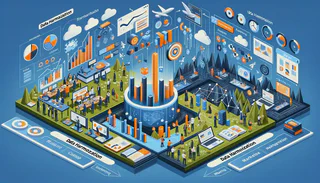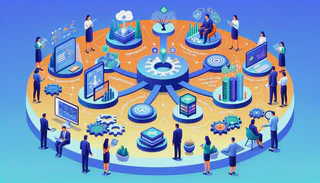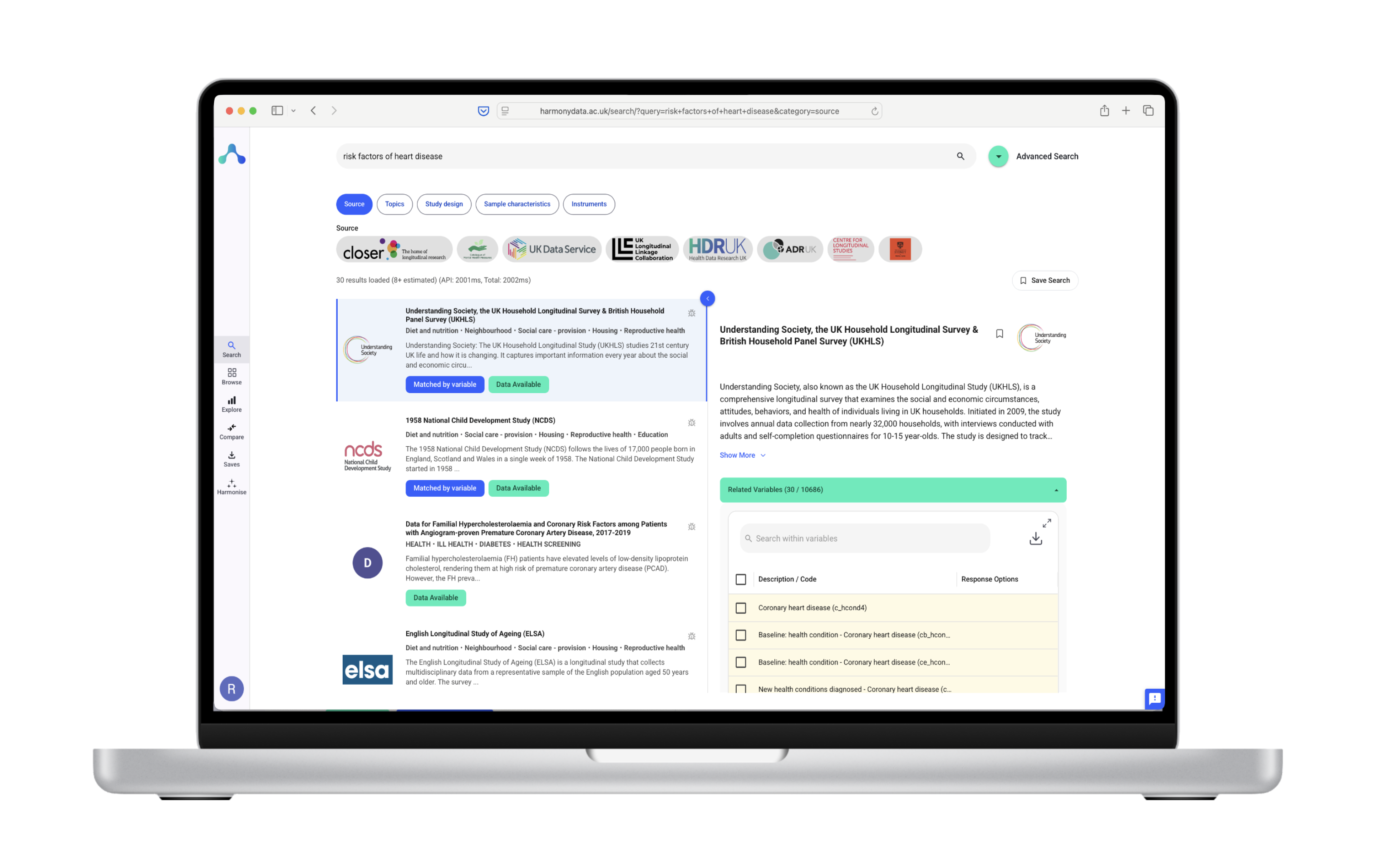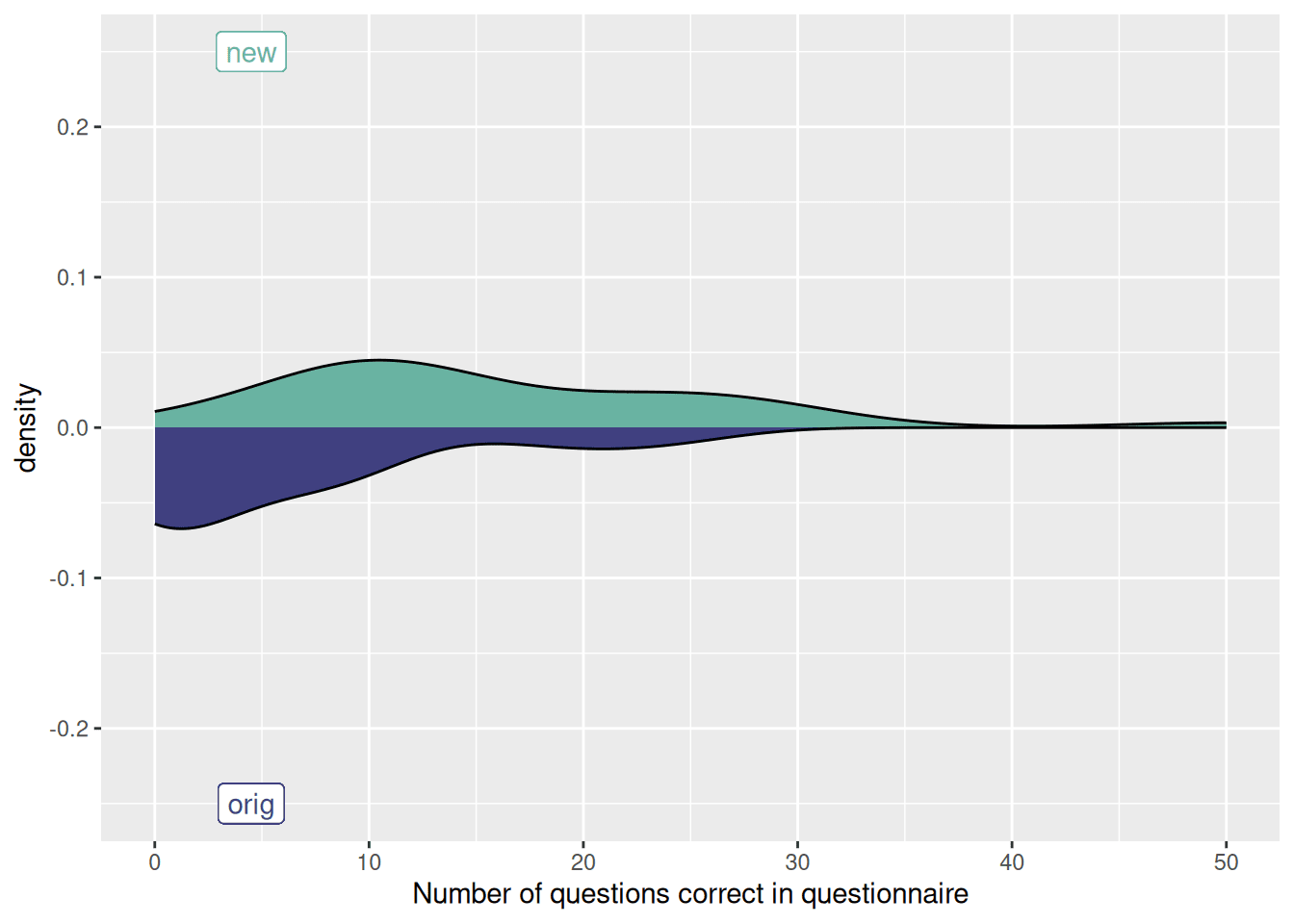
In the digital age, where data is as valuable as currency, marketing professionals face the challenge of navigating through vast oceans of information. The key to unlocking the potential of this data lies in harmonisation - a process that not only streamlines disparate data sources but also unlocks profound insights for targeted and effective marketing strategies.
Data harmonisation is a critical process in the marketing world, enabling organizations to standardize, integrate, and leverage data from diverse sources for strategic decision-making. The goal is to create a unified view of information, which can be instrumental in enhancing customer engagement, optimizing marketing strategies, and driving business growth. Drawing inspiration from successful practices in digital health data harmonisation, this blog post explores key strategies businesses can adopt to harmonise their marketing data effectively.
Before delving into strategies, it’s essential to grasp what data harmonisation entails. Data harmonisation refers to the process of bringing together data from various sources and ensuring that it is standardized, consistent, and usable for analysis. In marketing, this means creating a unified view of customer data, market research, and campaign results, regardless of the original source or format. The goal is to achieve a holistic understanding of the marketing landscape, enabling targeted strategies and personalized customer experiences.

The benefits of data harmonisation in marketing are manifold, each playing a crucial role in transforming how businesses interact with their customers, make decisions, and position themselves in the competitive landscape. Here’s a closer look at why data harmonisation is a cornerstone of effective marketing:
Enhanced Customer Insights: By integrating data from various sources into a unified view, companies gain deep insights into customer behavior, preferences, and needs. This comprehensive understanding allows for the creation of highly personalized marketing strategies and campaigns that resonate with the target audience, fostering stronger customer relationships and loyalty.
Improved Decision Making: Harmonised data significantly reduces inconsistencies, inaccuracies, and gaps that can lead to flawed analyses and decisions. With a clean, consistent data set, businesses can rely on their data to make informed strategic decisions, from product development to market entry strategies and beyond.
Efficiency and Cost Savings: Data harmonisation streamlines data management processes by reducing the need for manual data cleaning and reconciliation. This not only saves time but also reduces the operational costs associated with managing disparate data sources. Efficiency gains also translate into faster time-to-market for marketing campaigns and the ability to quickly adjust strategies in response to market feedback.
Competitive Advantage: In a fast-paced market, the ability to quickly analyse data and act upon insights can provide a significant competitive edge. Companies with harmonised data can more swiftly identify trends, adapt to changing customer preferences, and deploy targeted marketing efforts. This agility enables them to stay ahead of competitors and capture market opportunities as they arise.
So, Data harmonisation is not merely a technical endeavor; it is a strategic imperative that underpins the success of modern marketing efforts. By ensuring data is consistent, comprehensive, and actionable, businesses can unlock new levels of customer engagement, operational efficiency, and market responsiveness, driving growth and competitive advantage in today’s data-driven economy.

The cornerstone of effective data harmonisation is the creation of standard data models. These models provide a blueprint for organizing various types of data, such as customer information, transaction records, and engagement metrics, into a uniform format. By establishing these standards, businesses ensure that data collected from diverse sources can be seamlessly integrated, enabling a comprehensive view of marketing operations and customer interactions.
A robust data governance framework is critical for successful data harmonisation. Such a framework outlines the protocols for maintaining data quality, defines who can access data and under what circumstances, and ensures compliance with privacy laws and ethical guidelines. Effective data governance not only guarantees the reliability and consistency of data but also builds trust among stakeholders by safeguarding sensitive information.
To achieve harmonisation, it’s essential to standardize the inputs across all data collection points. This means creating uniform definitions and formats for every piece of data, from customer identifiers to transaction details, ensuring that data from various channels and platforms can be easily consolidated. Standardizing data inputs is akin to speaking a common language across all marketing efforts, facilitating clearer communication and more cohesive strategy development.
Centralizing data storage is another critical step towards harmonisation. A centralized repository ensures that data is stored in a single location, making it easier to access, analyse, and update. This centralization also ensures that any modifications to the data are reflected across all uses, maintaining data integrity and consistency across the organization.
Define Key Metrics: Begin by identifying and standardizing key performance indicators (KPIs) for all marketing activities. This ensures that success is measured consistently across different campaigns and channels, enabling accurate performance assessment and comparison.
Uniform Data Collection Practices: Establish clear guidelines for data collection, processing, and storage. This includes specifying the methods for collecting customer data, the formats in which data should be stored, and the processes for ensuring data quality and integrity. Uniform data collection practices are essential for creating a reliable data foundation that supports effective analysis and decision-making.
A critical step towards achieving data harmonisation is the meticulous cleaning and preparation of data. This process involves the elimination of inaccuracies, the merging of duplicates, and the removal of irrelevant data points to ensure the highest quality of data for analysis. Leveraging advanced analytics and artificial intelligence (AI) tools can significantly automate and streamline this process, enhancing both efficiency and accuracy, and laying a solid foundation for harmonisation.
The role of technology in facilitating data harmonisation cannot be overstated. Data integration tools are instrumental in automating the collection, cleaning, and consolidation of data from diverse sources. These tools are designed to minimize manual intervention, thereby reducing the likelihood of errors, cutting down on redundancies, and accelerating the overall process of data processing. The result is a streamlined workflow that ensures data from various channels can be integrated seamlessly.
Once data has been harmonised, the application of advanced analytics becomes possible, unlocking the potential to derive deep, actionable insights. Techniques such as machine learning and predictive analytics are particularly valuable, enabling marketers to identify patterns, trends, and customer behaviors that were previously obscured. These insights can significantly enhance the effectiveness of marketing strategies, enabling precise targeting, segmentation, and personalization efforts that resonate more deeply with the target audience.
Data Management Platforms (DMPs): DMPs are essential for aggregating and managing data from a multitude of sources, offering marketers a unified view of their audience. These platforms facilitate the organization, analysis, and activation of customer data across marketing channels, enhancing the personalization and relevance of campaigns.
Integration Platforms: The use of Integration Platform as a Service (iPaaS) solutions is recommended for seamless connectivity between disparate systems and data formats. iPaaS platforms enable the efficient transfer and integration of data across various cloud and on-premises environments, simplifying the task of managing complex data ecosystems and ensuring that data flows smoothly and consistently across all marketing tools and platforms.
Key to the success of data harmonisation initiatives is the cultivation of a data-driven culture within the organization. This encompasses educating and training marketing teams on the significance of data integrity, the proficient use of analytics tools, and the adept interpretation of data insights. By empowering team members to integrate data into their everyday decision-making processes, organizations can unlock more innovative, efficient, and impactful marketing strategies, driving forward both creativity and analytical thinking.
The process of harmonising data, particularly when it involves personal and sensitive information, brings to the forefront important ethical considerations. In line with sectors like healthcare, which prioritize patient privacy, marketers must ensure their practices are in strict adherence to privacy laws and ethical standards, including compliance with regulations such as GDPR and CCPA. This commitment to ethical data use not only protects the organization legally but also builds trust with customers, affirming the company’s respect for their privacy and data security.
The journey of data harmonisation is ongoing, necessitating a commitment to continuous improvement and flexibility. As the digital landscape evolves and new sources of data become available, strategies for data harmonisation must be revisited and refined. This includes conducting regular assessments of data quality, updating technology tools, and revising governance policies to ensure the data strategy remains aligned with the organization’s objectives and the dynamic market environment.
Regular Data Audits: Periodic evaluations are crucial to identifying and addressing issues of data quality, such as duplications, inaccuracies, or gaps in information. These audits help maintain the integrity and value of the data over time.
Implement Data Governance: A robust data governance framework is essential for sustaining data quality and security. This framework should define clear policies and procedures for data management, ensuring that data practices are consistent, transparent, and in compliance with legal requirements.
Training and Education: Offer ongoing educational opportunities to staff on the latest data handling, analysis, and interpretation techniques. This fosters a workforce that is competent, confident, and capable of leveraging data to drive decisions.
Encourage Data Sharing: Promote an organizational ethos of transparency and collaboration by facilitating the open sharing of data insights across different departments. This approach encourages a more integrated and cohesive strategy, where insights from one area can inform and enhance activities in another, fostering a truly data-driven organization.
The path to achieving successful data harmonisation is both strategic and systematic, involving multiple steps and the commitment of various stakeholders within the organization. Here’s a structured approach to implementing data harmonisation in your business:
Securing Stakeholder Buy-In: Start with building a compelling case for data harmonisation, highlighting the potential benefits such as improved marketing efficiency, enhanced customer insights, and stronger competitive advantage. Engage with stakeholders at all levels to secure their support, emphasizing how data harmonisation aligns with the organization’s broader objectives.
Investing in Technology and Tools: Identify and acquire the necessary technologies and platforms that will support your data integration and analysis efforts. This may include data management platforms (DMPs), customer data platforms (CDPs), data integration tools, and advanced analytics software. The right technology stack is crucial for automating data collection, cleaning, integration, and analysis processes.
Establishing a Unified Data Framework: Develop a standardized framework for how data is collected, stored, processed, and analysed across the organization. This includes defining standard data models, implementing data governance policies, and ensuring compliance with data privacy regulations.
Training and Empowering Teams: Conduct training sessions to upskill your marketing and data teams in handling and analysing harmonised data. Encourage a culture of data-driven decision-making by empowering employees to leverage data insights in their roles.
Continuous Monitoring and Evaluation: Data harmonisation is not a set-and-forget process. Regularly monitor the quality of your data, the effectiveness of your data integration tools, and the outcomes of your marketing campaigns. Evaluate the performance of your data harmonisation efforts against predefined metrics and KPIs, and be prepared to make adjustments as needed.
Adapting to Change: Stay responsive to new technologies, emerging data sources, and evolving market trends. Update your data harmonisation strategies and technologies as necessary to maintain their effectiveness and ensure they continue to meet the organization’s needs.
Fostering Continuous Improvement: Encourage feedback from all levels of the organization regarding the data harmonisation process and its impact on marketing efforts. Use this feedback to drive continuous improvement, refining your approach to data harmonisation to better support your marketing objectives.
By following these steps, organizations can effectively implement data harmonisation, unlocking the full potential of their data to drive more informed, efficient, and impactful marketing strategies. The journey towards data harmonisation is ongoing, requiring dedication, adaptability, and a commitment to leveraging data as a strategic asset.

The future of data harmonisation in marketing is closely tied to advancements in AI and machine learning. These technologies are expected to significantly enhance data integration processes, enabling more sophisticated analysis and real-time data processing. As these tools become more accessible, they will allow for even greater personalization and efficiency in marketing campaigns.
Marketers can stay ahead by embracing these emerging technologies, investing in tools that automate and refine data harmonisation processes, and continuously updating their skills to leverage the full potential of AI-driven insights. Prioritizing data quality and integrating new data sources into a unified framework will be key to leveraging the evolving landscape of data harmonisation for competitive advantage.
The strategies for harmonising data in the marketing realm are pivotal for maximizing the effectiveness of marketing endeavors. Establishing a unified data framework, leveraging technology for efficient data integration, and nurturing a data-driven culture are essential steps for organizations aiming to gain a comprehensive understanding of their market and customers.
Data harmonisation transcends being merely a technical requirement; it’s a strategic necessity. By aligning disparate data sources, ensuring data quality, and promoting a data-centric culture, organizations unlock the full potential of their data assets. This enhances customer insights and decision-making, driving efficiency, innovation, and competitive advantage in the dynamic digital marketplace.
In the quest for marketing success, harmonised data is indeed the linchpin, enabling organizations to navigate the complexities of the digital age with confidence and precision.

